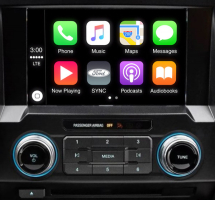
— A Ford privacy class action lawsuit is dismissed after an appeals court agreed with a lower court's dismissal.
According to the lawsuit, the infotainment systems allow occupants to use cell phones hands-free.
The systems allegedly download, copy and indefinitely store the call logs and text messages of any cell phones connected to the systems.
The class action alleges even if call logs and text messages are deleted from cell phones, the Ford vehicles still retain the calls and messages on the vehicle's onboard memory. This occurs even after the cell phone is disconnected from the vehicle.
And the lawsuit also alleges vehicle owners allegedly cannot access or delete the personal information once it has been stored by the vehicle.
The Ford privacy lawsuit was filed by plaintiffs Mark Jones and Michael McKee.
Plaintiff Jones owns a Ford vehicle equipped with an infotainment system and says he exchanged private text messages with plaintiff McKee before connecting his cell phone to the vehicle’s onboard infotainment system.
Both Plaintiffs allege their private communications were unlawfully recorded from a cell phone and permanently stored on his Ford vehicle in violation of the Washington Privacy Act (WPA).
Ford allegedly never accessed the communications of the vehicle, but a third-party company could. The lawsuit alleges Berla Corporation produces hardware and software "capable of extracting stored text messages and call logs stored on a vehicle’s on-board memory."
"Berla products are not generally available to the public, and sales access is restricted to law enforcement, the military, civil and regulatory agencies, and select private investigation service providers." — Ford privacy lawsuit
Ford Privacy Lawsuit Dismissed
Judge David G. Estudillo dismissed the Ford class action lawsuit because the plaintiffs failed to allege an injury to their “person,” “business,” or “reputation,” as the Washington Privacy Act requires. The judge also ruled Ford, "did not violate the WPA merely by manufacturing and selling vehicles with infotainment systems."
The plaintiffs appealed to the U.S. Court of Appeals for the Ninth Circuit which agreed with the district court's dismissal of the lawsuit.
The appeals court noted a plaintiff must show that “a violation of [the WPA] has injured his or her business, his or her person, or his or her reputation." But the plaintiffs failed to do that.
The Ford privacy lawsuit was filed in the U.S. District Court for the Western District of Washington: Jones, et al., v. Ford Motor Company.




